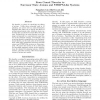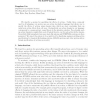875 search results - page 24 / 175 » Situated Actions and Cognition |
ATAL
2003
Springer
15 years 6 months ago
2003
Springer
People can interact much more readily with a multi-agent system if they can understand it in cognitive terms. Modern work on “BDI agents” emphasizes explicit representation of ...
107
click to vote
COGSCI
2002
15 years 1 months ago
2002
This study addresses the dynamical nature of a "representation-hungry" cognitive task involving an imagined action. In our experiment, participants were handed rods that...
114
click to vote
AAAI
2000
15 years 2 months ago
2000
We describe a system for specifying the effects of actions. Unlike those commonly used in AI planning, our system uses an action description language that allows one to specify th...
157
click to vote
CORR
2011
Springer
14 years 5 months ago
2011
Springer
We describe a system for specifying the effects of actions. Unlike those commonly used in AI planning, our system uses an action description language that allows one to specify t...
130
click to vote
ATAL
2004
Springer
15 years 5 months ago
2004
Springer
In this paper we introduce a model for direct communication in situated multi-agent systems. Direct communication is typically associated with cognitive agents, where the informat...


